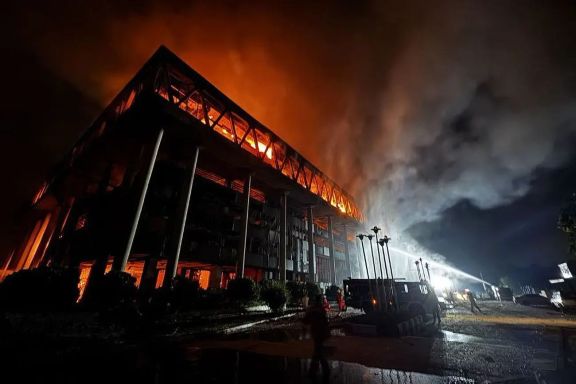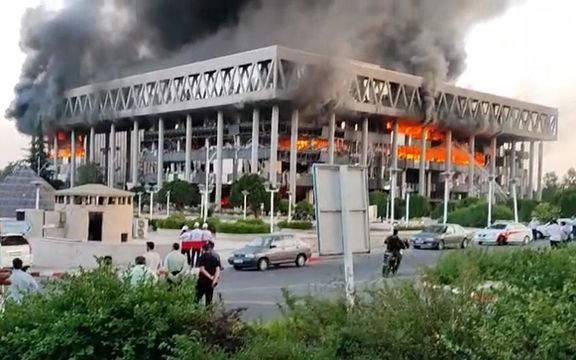Access to the state-run broadcaster’s complex, located in northern Tehran’s Jam-e-Jam area, is now tightly restricted, with only cleared personnel allowed to enter.
Witnesses report heightened security checks and a significant armed presence. The compound has effectively turned into a restricted zone, one staff member said, speaking on condition of anonymity.
Sources told Iran International that some senior editorial staff and reporters left the building hours before the strike after receiving warning signals. Others, citing safety concerns, have refused to return.
“There is deep anxiety among middle managers and staff — not only about their security but also their livelihoods,” said one source.
The strike on Monday — part of a wider escalation between Israel and Iran — caused technical disruptions inside the broadcaster as dust and smoke engulfed the studio of the live broadcast, with videos showing fire coming from the glass building.
The extent of physical damage remains unclear, but sources say programming has been affected and internal operations significantly curtailed.
Iranian officials have condemned the attack as a violation of international law. “Even during wartime, media facilities are protected under international humanitarian rules,” one senior official told local press, referring to Article 79 of Protocol I of the Geneva Conventions, which classifies journalists as civilians so long as they do not engage in hostilities.
IRIB President Peyman Jebelli confirmed that the IRINN studio (IRIB’s 24-hour news network) had been “destroyed,” but vowed that programming would gradually resume.
“Despite the damage, our core broadcasts — including the 20:30 news bulletin — will return,” Jebelli said in remarks broadcast on Wednesday. He himself was reportedly present at the time of the attack but was unharmed.
The targeted structure, known as the Glass Building, is an iconic symbol of Iranian modernist architecture, designed by famed architect Abdol-Aziz Farmanfarmaian in the 1960s. It housed newsrooms and executive offices.
The fourth floor, believed to have suffered the most damage, was home to the news editorial board and the political bureau.
While official casualty figures have not been confirmed, local media reported the deaths of three people, including senior news editor Nima Rajabpour and administrative staff member Masoumeh Azimi.
TV anchor Sahar Emami was engulfed in smoke and debris as she was speaking live on air, with loud booms rocking the studio.
Amid the strike, she told viewers: “The sound you just heard is the sound of the aggressor attacking our homeland, the sound of the aggressor seeking to stifle rightfulness and truth."
The cameras continued to roll before she was forced to abandon the studio.


